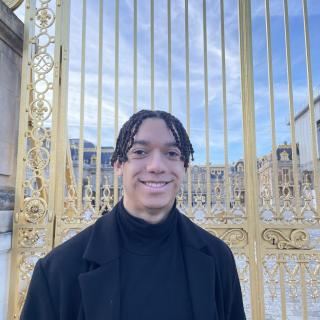Karen Taylor (IES Abroad Nantes 1976-77) developed a love of French from a young age, due to the encouragement of her mother. From studying French in school, to studying abroad, to falling in love, to raising her children—French has played a central role in Karen’s life. After practicing real estate and banking law, Karen switched gears to create a culturally immersive French language program for grade school children. Read on to discover what inspired Karen to embark on a second career in teaching.
IES Abroad: As an undergrad at Dickinson College, what led you to study abroad in Nantes, France?
Karen Taylor (KT): I started taking French in 8th grade and took it through high school and college, but my interest in French began when I was very young. My mother had always wanted to speak French, so she used to get me books and records in French. She even found a French teacher to do an after-school French class for me and my classmates in first grade. I remember visiting Quebec when I was about eight and trying to pretend I could speak French. Even though she never learned to speak French, my mother conferred her love of all things French to me. Despite my many years of studying French, I could not really speak or understand it until I spent my junior year of college in Nantes. I chose Nantes over Paris because I knew I would encounter fewer people who spoke English in Nantes, and I wanted to be forced to speak French all of the time.
IES Abroad: How did you experience language immersion in Nantes and what impact did that have on you?
KT: I had no idea what I was in for when I arrived in Nantes and faced the cold reality that I would be speaking a foreign language 24/7. It was the hardest thing I ever did because there was really no escape from it. My brain was always on. Even at night I would find myself struggling to speak French in my dreams. I think I was bone tired for at least my first four or five months in Nantes. You also don’t realize how hard it is on your facial muscles to constantly speak a foreign language. You use different facial muscles to speak French, so even my face was tired. Despite the effort it took, I consider learning to speak French fluently to be one of my greatest accomplishments. I took it very seriously because I knew I would never have another opportunity to live in France and learn French.
IES Abroad: Where did your career take you after graduating? How did the skills you developed abroad transfer professionally?
KT: I went to law school at the University of Virginia and received my J.D. in 1981. I then moved to Houston and practiced real estate and banking law. I can’t say that speaking French helped me in my legal practice. It did cause me to meet my husband, Jay. I had applied to several law firms in Houston, including his law firm. He was the lowly associate tasked with sifting through the résumés. When he came to mine, he saw that I had studied in Nantes. He had studied abroad in Paris and also spoke French, so he pulled my résumé out of the pile so he could meet me. Four years later, we were married. I always tell kids that you never know what the study of French will bring you. Sometimes it gives you a husband (or a wife).
IES Abroad: You recently embarked on a second career, creating a language school for second to fifth graders in your local district. What inspired you?
KT: About six years ago, I was asked to fill in as a French teacher at a local middle school. I had never taught before, but I was eager to communicate my love of French to my students. I taught French exactly as I had been taught and the old school methods did not get my students even remotely close to proficiency. I had a wide range of students, from gifted to those with learning disabilities. Most of my students could not or would not memorize anything, and it made no sense that I was mostly using English to teach French. After the year ended, I decide I would not teach French again unless I could find a better way to teach it. Over that summer, I started studying for my certification exam to be a French teacher. I was using About.com to study, so I took a break and entered “different ways to teach French” and AIM Language Learning popped up. Once I found AIM, I never looked back.
After learning everything I could about AIM (described below), I began to look for an opportunity to teach with it. I began by teaching French to women at my church while I called various schools and programs to see who might be interested in starting an AIM language program for children. Finally, I found an after-school program in a church not far from where I live. I called and asked the director if she would be interested in starting a French class for kids in her program and she said, “Okay, why not?” After that, it was a question of advertising and creating some interest among parents. Fortunately, the schools feeding into this program are some of the best in Houston, so parents were interested in the class.
IES Abroad: What makes the program unique?
KT: AIM was a method developed by Canadian French teacher Wendy Maxwell about 20 years ago to teach French, although it has now expanded to Spanish, Mandarin, English, and Japanese. In AIM, every word is gestured, and instead of having the language introduced through grammar rules and vocabulary themes, AIM focuses on teaching the words most critical for communication. The gestures communicate meaning and help with memory so that English can be completely eliminated from the classroom. The students speak and do the gestures with the teacher. In a traditional language class, a student might speak once or twice per class, but the students in an AIM class speak French during the entire class.
Another benefit of the gestures is that they give the students a lot of grammar clues. For instance, AIM has gestures to indicate whether articles and adjectives are masculine or feminine. The gestures also indicate infinitives and past tense. Each AIM unit includes a play the kids learn and perform at the end of the unit. The play introduces more vocabulary and opens up the classroom world. The program is enhanced with songs, raps, and dancing, so kids can learn in a lot of different ways. Grammar rules are taught in raps. Even the adults I teach, who are in their 60’s and 70’s, remember the raps years later.
IES Abroad: What have you learned from teaching?
KT: The kids make amazing progress in just a few months. Even from the beginning, they spontaneously use the vocabulary they have learned to express their thoughts. They always tell me how they are at the beginning of every class and several of them like to tell me how bad they are doing because they are in French class. They were delighted to realize I will let them complain about French class, as long as they do it in French. I challenge them to use more vocabulary each time.
Teaching has its frustrations but it can also feel very rewarding. About a month ago, the father of one of my student’s stopped in and observed the class. At the end, I asked him what he thought and he said, “I love this class!” He then turned to his daughter and said, “Do you realize how lucky you are to be in this class? You have learned more French in three months than most people learn after years of study!”
IES Abroad: How did your study abroad experience shape how you raised your children?
KT: Since my husband and I both speak French, we resolved that both of our children would also speak French. When my daughter was a baby, we had French au pairs and we often read to the kids in French. We had all the Disney movies in French. When they were three, we enrolled them in the French section of the Awty International School. Our children attended from pre-K3 through 5th grade. After that, we put them in public school, but they always had a French tutor. Our daughter was a Rotary exchange student in France, so she did her last year of high school twice. She is very fluent and my son also speaks French well. Having everyone in the family fluent in French makes visiting and hosting French friends very easy. We don’t have to translate for anyone.
IES Abroad: Do you have any advice for students considering studying abroad or interning?
KT: My advice is do it! Living abroad will be the most exhilarating and empowering experience of your life.
When planning for a year abroad, I would advise considering the following:
Learn more about studying abroad in France, and check out all of our Alum of the Month profiles to see real examples of how study abroad changed the lives and careers of our former students. Find out how you can give more students the opportunity to study abroad by supoprting scholarships.





